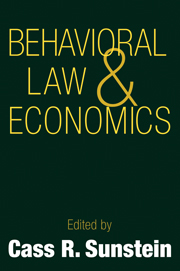Book contents
- Frontmatter
- Contents
- Contributors
- Acknowledgments
- Introduction
- Part I Overview and Prospects
- Part II Heuristics and Biases: Shortcuts, Errors, and Legal Decisions
- Part III Valuation: Values and Dollars in the Legal System
- Part IV The Demand for Law: Why Law Is As It Is
- 13 Some Implications of Cognitive Psychology for Risk Regulation
- 14 Explaining Bargaining Impasse: The Role of Self-serving Biases
- 15 Controlling Availability Cascades
- 16 Cognitive Theory and Tax
- Index
15 - Controlling Availability Cascades
Published online by Cambridge University Press: 05 June 2012
- Frontmatter
- Contents
- Contributors
- Acknowledgments
- Introduction
- Part I Overview and Prospects
- Part II Heuristics and Biases: Shortcuts, Errors, and Legal Decisions
- Part III Valuation: Values and Dollars in the Legal System
- Part IV The Demand for Law: Why Law Is As It Is
- 13 Some Implications of Cognitive Psychology for Risk Regulation
- 14 Explaining Bargaining Impasse: The Role of Self-serving Biases
- 15 Controlling Availability Cascades
- 16 Cognitive Theory and Tax
- Index
Summary
The purpose of this chapter is to identify a set of interlinked social mechanisms that have important, possibly desirable, but sometimes harmful effects on risk regulation. The harmful effects range from inconsistent health regulations to mass anxiety about foods with no scientifically confirmed health hazards. The underlying mechanisms help shape the production of law through their effects on legislators, administrative agencies, and courts.
The mechanisms outlined below are mediated by the availability heuristic, a pervasive mental shortcut whereby the perceived likelihood of any given event is tied to the ease with which its occurrence can be brought to mind. Cognitive psychologists consider the availability heuristic to be a key element of individual judgment and perception. They demonstrate that the probability assessments we make as individuals are frequently based on how easily we can think of relevant examples. Our principal claim here is that this heuristic interacts with identifiable social mechanisms to generate availability cascades: social cascades, or simply cascades, through which expressed perceptions trigger chains of individual responses that make these perceptions appear increasingly plausible through their rising availability in public discourse. Availability cascades may be accompanied by counter-mechanisms that keep perceptions consistent with the relevant facts. Under certain circumstances, however, they will generate persistent collective availability errors: widespread mistaken beliefs grounded in interactions between the availability heuristic and the social mechanisms described below. The resulting mass delusions may last indefinitely, and they may produce wasteful or even harmful laws and policies.
- Type
- Chapter
- Information
- Behavioral Law and Economics , pp. 374 - 397Publisher: Cambridge University PressPrint publication year: 2000
- 12
- Cited by



